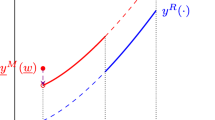Abstract
We consider a repeated family bargaining model that links the topics of employment and households. A key aspect of the model is that marital bargaining power is determined endogenously. We show that: (1) the efficiency of household decisions is sometimes inversely related to the prevailing degree of gender discrimination in labor markets; (2) women who are discriminated against have difficulty enforcing cooperative household outcomes because they may be extremely limited to credibly punish opportunistic behavior by their male partners; (3) the likelihood that sharing rules such as “equal sharing” are maintained throughout a marriage relationship is highest when men and women face equal opportunities in labor markets.
Similar content being viewed by others
References
Basu K (2006) Gender and say: a model of household behavior with endogenously determined balance of power. Econ J 116(511):558–580
Becker GS (1974) A theory of marriage. In: Schultz TW (ed) Economics of the family. University of Chicago Press, Chicago
Becker GS (1991) A treatise of the family. Enlarged edition. Harvard University Press, Cambridge
Becker GS, Landes EM, Michael RT (1977) An economic analysis of marital instability. J Polit Econ 85(6):1141–1187
Bergstrom TC (1997) A survey of theories of the family. In: Rosenzweig MR, Stark O (eds) Handbook of population and family economics. Elsevier, Amsterdam
Chiappori PA (1992) Collective labor supply and welfare. J Polit Econ 100(3):437–467
Chiappori PA, Fortin B, Lacroix G (2002) Marriage market, divorce legislation, and household labor supply. J Polit Econ 110(1):37–72
Ermisch J (2003) An economic analysis of the family. Princeton University Press, Princeton
Francois P (1998) Gender discrimination without gender difference: theory and policy responses. J Public Econ 68(1):1–32
Haddad L, Kanbur R (1990) How serious is the neglect of intra-household inequality? Econ J 100(402):866–881
Halonen M (2002) Reputation and the allocation of ownership. Econ J 112(481):539–558
Iyigun MF, Walsh RP (2007) Endogenous gender power, household labor supply and the demographic transition. J Dev Econ 82(1):138–155
Konrad KA, Lommerud KE (2000) The bargaining family revisited. Can J Econ 33(2):471–487
Kuznets S (1955) Economic growth and income inequality. Am Econ Rev 45(1):1–28
Lundberg S, Pollak RA (1993) Separate spheres bargaining and the marriage market. J Polit Econ 101(6):988–1010
Lundberg S, Pollak RA (1996) Bargaining and distribution in marriage. J Econ Perspect 10(4): 139–158
Lundberg S, Pollak RA (2003) Efficiency in marriage. Rev Econ Household 1(3):153–167
Manser M, Brown M (1980) Marriage and household decision theory: a bargaining analysis. Int Econ Rev 21(1):21–34
McElroy M (1990) The empirical content of Nash-bargained household behavior. J Hum Resour 25(4):559–583
McElroy M, Horney M (1981) Nash-bargained decisions: toward a generalization of demand theory. Int Econ Rev 22(2):333–349
Mill JS (1970) The subjection of women. In: Rossi AS (ed) Essays on sex equality: John Stuart Mill and Harriet Taylor Mill. University of Chicago Press, Chicago
Moller Okin S (1995) Inequality between the sexes in different cultural contexts. In: Nussbaum M, Glover J (eds) Women, culture, and development. Oxford University Press, Oxford, New York
Muthoo A (2004) A model of the origins of basic property rights. Games Econom Behav 49:288–312
O’Donoghue C, Sutherland H (1999) Accounting for the family in European income tax systems. Camb J Econ 23:565–598
OECD Development Assistance Committee (1998) DAC guidelines for gender equality and women’s empowerment in development co-operation, Paris
Rainer H (2007) Should we write prenuptial contracts? Eur Econ Rev 51(2):337–363
Rasul I (2006) The economics of child custody. Economica 73(289):1–26
Sen A (1990) Gender and cooperative conflicts. In: Tinker I (ed) Persistent inequalities. Oxord University Press, Oxford, New York
Udry C (1996) Gender, agricultural production, and the theory of the household. J Polit Econ 104(5):1010–1046
United Nations Development Programme (1995) Human Development Report, Oxford University Press, Oxford, New York
Vagstad S (2001) On private incentives to acquire household production skills. J Popul Econ 14(2):301–312
Author information
Authors and Affiliations
Corresponding author
Additional information
Responsible editor: Deborah Cobb-Clark
Rights and permissions
About this article
Cite this article
Rainer, H. Gender discrimination and efficiency in marriage: the bargaining family under scrutiny. J Popul Econ 21, 305–329 (2008). https://doi.org/10.1007/s00148-007-0143-x
Received:
Accepted:
Published:
Issue Date:
DOI: https://doi.org/10.1007/s00148-007-0143-x




